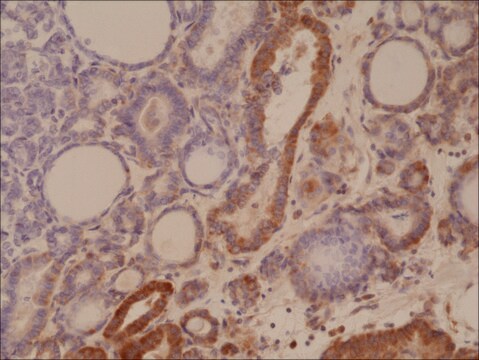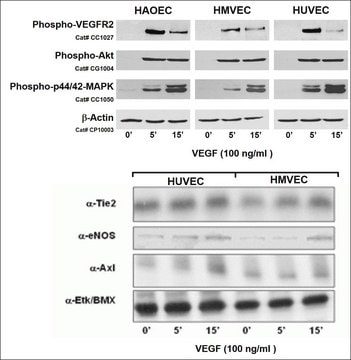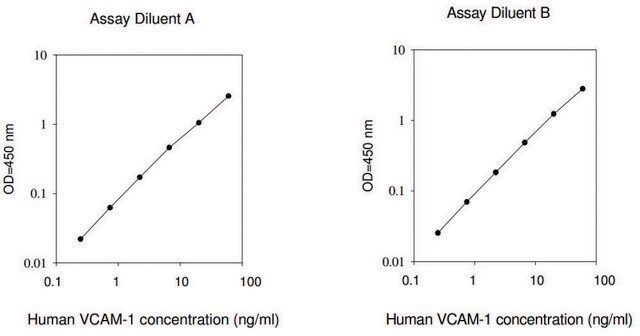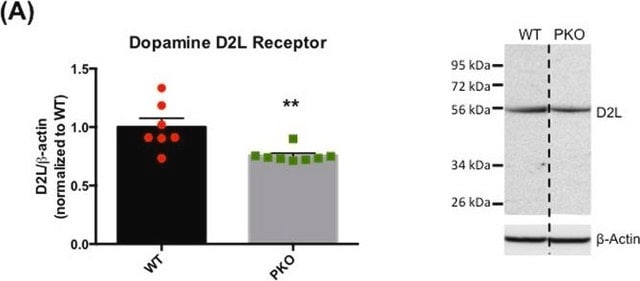Összes fotó(1)
Fontos dokumentumok
V9134
Monoclonal Anti-Vascular Endothelial Growth Factor Receptor-2 antibody produced in mouse
clone KDR-1, ascites fluid
Szinonimák:
Anti-KDR, Anti-VEGF R-2
Bejelentkezésa Szervezeti és Szerződéses árazás megtekintéséhez
Összes fotó(1)
About This Item
konjugátum:
unconjugated
application:
ELISA (i)
IHC (f)
IHC (f)
klón:
KDR-1, monoclonal
faj reaktivitás:
human
citations:
25
technika/technikák:
immunohistochemistry (frozen sections): 1:800 using human placenta
indirect ELISA: suitable
indirect ELISA: suitable
Javasolt termékek
biológiai forrás
mouse
Minőségi szint
konjugátum
unconjugated
antitest forma
ascites fluid
antitest terméktípus
primary antibodies
klón
KDR-1, monoclonal
tartalmaz
15 mM sodium azide
faj reaktivitás
human
technika/technikák
immunohistochemistry (frozen sections): 1:800 using human placenta
indirect ELISA: suitable
izotípus
IgG1
UniProt elérési szám
kiszállítva
dry ice
tárolási hőmérséklet
−20°C
célzott transzláció utáni módosítás
unmodified
Géninformáció
human ... KDR(3791)
Általános leírás
Monoclonal Anti-Vascular Endothelial Growth Factor Receptor-2 (mouse IgG1 isotype) is derived from the KDR-1 hybridoma produced by the fusion of mouse myeloma cells and splenocytes from an immunized mouse. Vascular endothelial growth factor (VEGF), is a homodimeric heparin-binding glycoprotein. It is a member of a family of endothelial cell mitogenic and angiogenic factors. The VEGFR2 gene has been mapped to human chromosome 4q11-q12, which is the same locus for PDGF receptor and c-kit.
The antibody reacts specifically with VEGF receptor 2 (KDR) and does not recognize VEGF receptor-1 (Flt1 receptor), VEGF receptor 3 (sFlt4), and PDGF-Rβ.
Immunogén
recombinant human extracellular domain of VEGFR-2 (KDR).
Alkalmazás
Monoclonal Anti-Vascular Endothelial Growth Factor Receptor-2 antibody produced in mouse has been used in:
- immunohistochemistry
- histology
- immunostaining
- enzyme linked immunosorbent assay (ELISA)
Monoclonal Anti-Vascular Endothelial Growth Factor Receptor-2 antibody produced in mouse was used for FACS analysis of HUVECs.
Biokémiai/fiziológiai hatások
Vascular endothelial growth factor (VEGF) specifically stimulates the proliferation of endothelial cells isolated from both small and large vessels. These include endothelial cells from adrenal cortex, cerebral cortex, fetal and adult aorta and human umbilical vein.
Vascular endothelial growth factors receptors (VEGF Rs) are receptor tyrosine kinases that bind to VEGF. VEGF plays an important role in embryonic vasculogenesis, angiogenesis and homeostasis. The binding of VEGF to VEGF R2 results in activation of MAPK, PI3K, PKC, FAK and Src kinase pathways. The biological roles of VEGF R2 include in epithelial cell growth, proliferation, survival, migration, vascular permeability and angiogenesis.
Jogi nyilatkozat
Unless otherwise stated in our catalog or other company documentation accompanying the product(s), our products are intended for research use only and are not to be used for any other purpose, which includes but is not limited to, unauthorized commercial uses, in vitro diagnostic uses, ex vivo or in vivo therapeutic uses or any type of consumption or application to humans or animals.
Nem találja a megfelelő terméket?
Próbálja ki a Termékválasztó eszköz. eszközt
Tárolási osztály kódja
10 - Combustible liquids
WGK
WGK 1
Lobbanási pont (F)
Not applicable
Lobbanási pont (C)
Not applicable
Válasszon a legfrissebb verziók közül:
Már rendelkezik ezzel a termékkel?
Az Ön által nemrégiben megvásárolt termékekre vonatkozó dokumentumokat a Dokumentumtárban találja.
Chie-Pein Chen et al.
Stem cells (Dayton, Ohio), 26(2), 550-561 (2007-11-03)
Maternal cells can become engrafted in various fetal organs during pregnancy. The nature of the cells and the mechanisms of maternofetal cell trafficking are not clear. We demonstrate that human lineage-negative, CD34-negative (Lin(-)CD34(-)) multipotent mesenchymal stromal cells express alpha(2), alpha(4)
Vascular endothelial growth factor (VEGF) is an autocrine growth factor for VEGF receptor-positive human tumors
Masood R, et al.
Blood, 98(6), 1904-1913 (2001)
Axitinib affects cell viability and migration of a primary foetal lung adenocarcinoma culture
Menna C, et al.
Cancer Investigation, 32(1), 13-21 (2014)
Markus Meissner et al.
Circulation research, 94(3), 324-332 (2003-12-20)
Peroxisome proliferator-activated receptors (PPARs) are ligand-activated transcription factors, originally implicated in the regulation of lipid and glucose homeostasis. In addition, natural and synthetic PPAR activators may control inflammatory processes by inhibition of distinct proinflammatory genes. As signaling via the vascular
Walderik W Zomerman et al.
PloS one, 10(10), e0141381-e0141381 (2015-10-27)
Recent clinical trials investigating receptor tyrosine kinase (RTK) inhibitors showed a limited clinical response in medulloblastoma. The present study investigated the role of micro-environmental growth factors expressed in the brain, such as HGF and EGF, in relation to the effects
Tudóscsoportunk valamennyi kutatási területen rendelkezik tapasztalattal, beleértve az élettudományt, az anyagtudományt, a kémiai szintézist, a kromatográfiát, az analitikát és még sok más területet.
Lépjen kapcsolatba a szaktanácsadással








